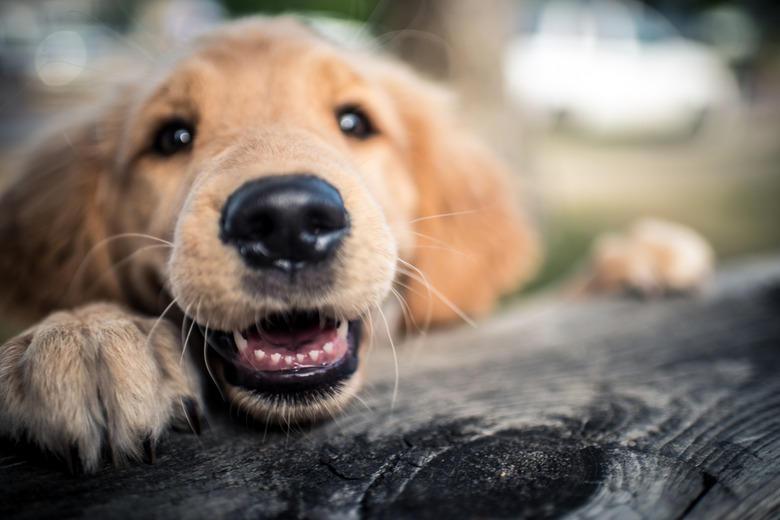My Puppy Knocked A Tooth Loose
After roughhousing and playing a game of tug-of-war with your energetic pup, you may notice something stuck to the toy: a tooth. Don't panic. Much like human children, puppies will loosen up teeth and knock them out completely during everyday activities. It's just a sign that he's growing up as his big boy teeth are coming in.
Teething Timeline
Puppies aren't born with any teeth; after all, they don't need them while they're nursing. But right around 4 weeks of age, those teeny sharp milk teeth start erupting. The front teeth come in first — typically six on top and six on the bottom. Those canine incisors start popping in around the five-week mark, while the premolars in the back make an appearance at about 6 weeks of age.
What to Expect
As those grownup teeth start making their way in, they'll naturally loosen up some of the baby teeth. Sometimes those teeth pop out on their own — like during a play session, while eating or while he's bathing himself. Other times, though, adult teeth grow in while the baby teeth are still stuck, giving Sammy an overly crowded smile. If he doesn't knock the baby teeth out or if they don't fall out on their own, you may have to take him to the vet to have them pulled.
What You Can Do
Teething lasts for months. That full adult set of teeth won't be complete until sometime around Sammy's first birthday — give or take a few weeks. In the meantime, you can help Sammy's teething stage progress in the right direction. Give him plenty of things to chew on, such as sturdy rubber treat balls, rope bones or durable rubber-based bones. Chewing helps pluck those loose teeth from his gums, speeding along the teething process. Help him out even more by giving him chew toys that are soothing. Soak a rope bone or even a small towel in water and freeze it overnight. The next day, your fur-covered buddy will have something to gnaw on that will relieve some of the pain and inflammation in his gums.
When to Worry
When your fur ball does lose a tooth, he may bleed a bit. A little blood is normal, but if it accompanies pus or if your beloved pooch seems like he's in pain — he stops eating or howls for no reason — get him into the vet immediately. While young puppies don't typically have serious dental problems, once in a while overcrowding can lead to impactions and infections along the gum line.
By Melodie Anne Coffman
References
The Whole Dog Journal: How to Properly Care for Your Dog's Teeth
University of Toronto: Periodontal Surgery For Impacted Canine Exposure — Patient
Toronto Star: Destructive Chewing May be a Sign of Dog's Teenage Teething Phase: Van Veen
About the Author
Melodie Anne Coffman specializes in overall wellness, with particular interests in women's health and personal defense. She holds a master's degree in food science and human nutrition and is a certified instructor through the NRA. Coffman is pursuing her personal trainer certification in 2015.
Always check with your veterinarian before changing your pet's diet, medication, or physical activity routines. This information is not a substitute for a vet's opinion.
